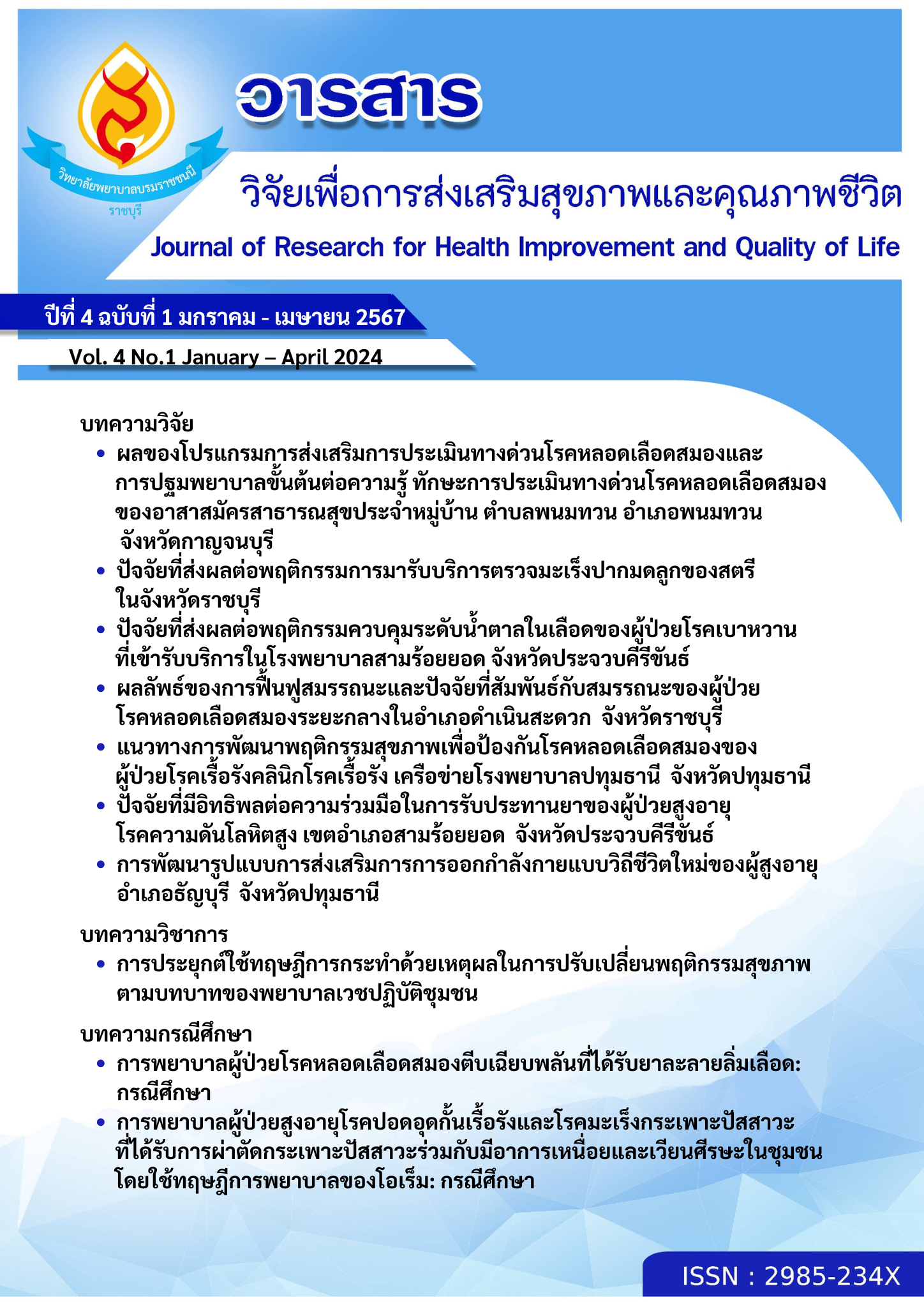ปัจจัยที่มีอิทธิพลต่อความร่วมมือในการรับประทานยาของผู้ป่วยสูงอายุโรคความดันโลหิตสูง เขตอำเภอสามร้อยยอด จังหวัดประจวบคีรีขันธ์
บทคัดย่อ
งานวิจัยเชิงพรรณนานี้มีวัตถุประสงค์เพื่อศึกษา 1) ระดับความร่วมมือในการรับประทานยา ความเชื่อด้านสุขภาพ การสนับสนุนทางสังคม และความรอบรู้ทางสุขภาพของผู้ป่วยสูงอายุโรคความดันโลหิตสูง และ 2) ปัจจัยที่มีอิทธิพลต่อความร่วมมือในการรับประทานยาของผู้ป่วยสูงอายุโรคความดันโลหิตสูง เขตอำเภอสามร้อยยอด จังหวัดประจวบคีรีขันธ์ กลุ่มตัวอย่างเป็นสูงอายุโรคความดันโลหิตสูง จำนวน 104 คน คัดเลือกด้วยการสุ่มแบบแบ่งชั้นภูมิ เครื่องมือวิจัยเป็นแบบสอบถาม วิเคราะห์ข้อมูลโดยใช้สถิติเชิงพรรณนาและวิเคราะห์การถดถอยพหุคูณ ผลการวิจัย พบว่า
1. ความร่วมมือในการรับประทานยา ความเชื่อด้านสุขภาพ และการสนับสนุนทางสังคมของผู้ป่วยสูงอายุโรคความดันโลหิตสูง โดยรวมอยู่ในระดับปานกลาง (M = 3.10, SD = 0.45; M= 3.39, SD = 0.59; M=3.05, SD = 0.61) ตามลำดับ และความรอบรู้ทางสุขภาพ โดยรวมอยู่ในระดับต่ำ (M = 2.35, SD = 0.45)
2. ความเชื่อด้านสุขภาพทำนายความร่วมมือในการรับประทานยาได้สูงสุด (beta = .613, p< .01) โดย 3 ตัวแปร สามารถร่วมกันทำนายความร่วมมือในการรับประทานยาได้ร้อยละ 55.30 (R2adj = .553 , p<.01)
ดังนั้นการส่งเสริมความร่วมมือในการรับประทานยาของผู้ป่วยสูงอายุโรคความดันโลหิตสูงควรเน้นปรับความเชื่อด้านสุขภาพและการสนับสนุนทางสังคมเพื่อให้ผู้สูงอายุมีกำลังใจปรับเปลี่ยนพฤติกรรมการรับประทานยาไปในทางที่เหมาะสม
เอกสารอ้างอิง
Becker, M.H. 1974. The health belief model and personal health behavior. Michigan: Charles B. Slack.
Bloom B S. (1956). Taxonomy of educational objectives, the classification of educational goals –Handbook I: cognitive domain. New York: McKay.
Department of Disease Control. (2023). The report of the situation of NCD (DM HT and risk factors in 2022). http://www.ddc.moph.go.th/uploads/publish/1035820201005073556.pdf. (in Thai)
Faul, F., Erdfelder, E., Buchner, A., & Lang, A. G. (2009). Statistical power analyses using G*Power 3.1: Tests for correlation and regression analyses. Behavior Research Methods, 41(4), 1149-1160.
House, J. S. (1981). Work stress and social support (addison-wesley series on occupational stress). Boston: Addison-Wesley Educational Publishers Inc.
Jankowska-Polawska, B., Uchmanowicz, I., Dudek, K., & Mazur, G. (2016). Relationship between patients’ knowledge and medication adherence among patients with hypertension. Patient preference and adherence, 2437-2447.
Jamkrajang, T., Boonchun, N., & Mala, J. (2017). The effectiveness of the self-efficacy and social support enhancement program on medication adherence and blood pressure among hypertensive elderly in community. Journal of The Royal Thai Army Nurses, 18(special issues), 270-279.
Khankaew, W., Thanaboonpuang, P., Intana, J. (2021). Selected factors affecting medication adherence among older patient with type 2 diabetes in Mueang District, Ratchaburi Province. Journal of Research for Health Improvement and Quality of Life, 1(1), 1-12. (in Thai)
Ministry of Public Health .(2023). Hypertension patient report, fiscal year 2021-2023. https://hdcservice.moph.go.th/hdc/reports/report.php?&cat_id=6a1fdf282fd28180eed7d1cfe0155e11&id=6b9af46d0cc1830d3bd34589c1081c68
Nutbeam, D. (2008). The evolving concept of health literacy. Social Science & Medicine, 67(12), 2072-2078.
Nutbeam, D. (2009). Defining and measuring health literacy: What can we learn from literacy studies?. International Journal of Public Health, 54(5), 303-305.
Pipatsombat, P., Kwanyuen, R., Jariyarattanakul, J. (2022). Effects of health literacy promotion program on medication adherence in Thai Ageing. Kuakarun Journal of Nursing, 29(1), 89-102. (in Thai)
Poulter, N. R., Borghi, C., Parati, G., Pathak, A., Toli, D., Williams, B., & Schmieder, R. E. (2020). Medication adherence in hypertension. Journal of hypertension, 38(4), 579-587.
Rosenstock, I. M., Strecher, V. J., & Becker, M. H. (1988). Social learning theory and the health belief model. Health education quarterly, 15(2), 175-183.
Sam Roi Yod Hospital .(2023). Diabetes patient report, fiscal year 2021-2023. Sam Roi Yod Hospital. (in Thai)
Sisaaad, B. (2013). Introduction to research (9th ed.). Bangkok : Suwiriyasan Publisher. (in Thai)
Sorensen, K., Van den Broucke, S., Fullam, J., Doyle, G., Pelikan, J, Slonska Z, & et al. (2012). Health literacy and public health: A systematic review and integration of definitions and models. BMC Public Health, 12(80),1-13.
Tachavijitjaru, C., Srisupornkornkul, A., & Changtej, S. (2018). Selected factors related with the health literacy of village health volunteer. Journal of The Royal Thai Army Nurses, 19(special issue), 320-332. (in Thai).
Thongyoo, C., & Dangdomyouth, P. (2017). The effect of health belief enhancement program on medication compliance behavior of schizophrenic patients. The Journal of Psychiatric Nursing and Mental Health, 31(1), 75-87.
Wise, M., & Nutbeam, D. (2015). Improving the health of communities by increasing critical health literacy. Health Voices, (17), 23-24.
World Health Organization .(2003). Adherence to long-term therapies: evidence for action: World Health Organization.
World Health Organization. (2021). The world health organization report. WHO: Geneva, Switzerland.
ดาวน์โหลด
เผยแพร่แล้ว
ฉบับ
ประเภทบทความ
สัญญาอนุญาต
ลิขสิทธิ์ (c) 2024 วิทยาลัยพยาบาลบรมราชชนนี ราชบุรี

อนุญาตภายใต้เงื่อนไข Creative Commons Attribution-NonCommercial-NoDerivatives 4.0 International License.
บทความทีตีพิมพ์ในวารสารนี้ถือว่าเป็นลิขสิทธิ์ของวิทยาลัยพยาบาลบรมราชชนนี ราชบุรี และผลงานวิชาการหรือวิจัยของคณะผู้เขียน ไม่ใช่ความคิดเห็นของบรรณาธิการหรือผู้จัดทํา




